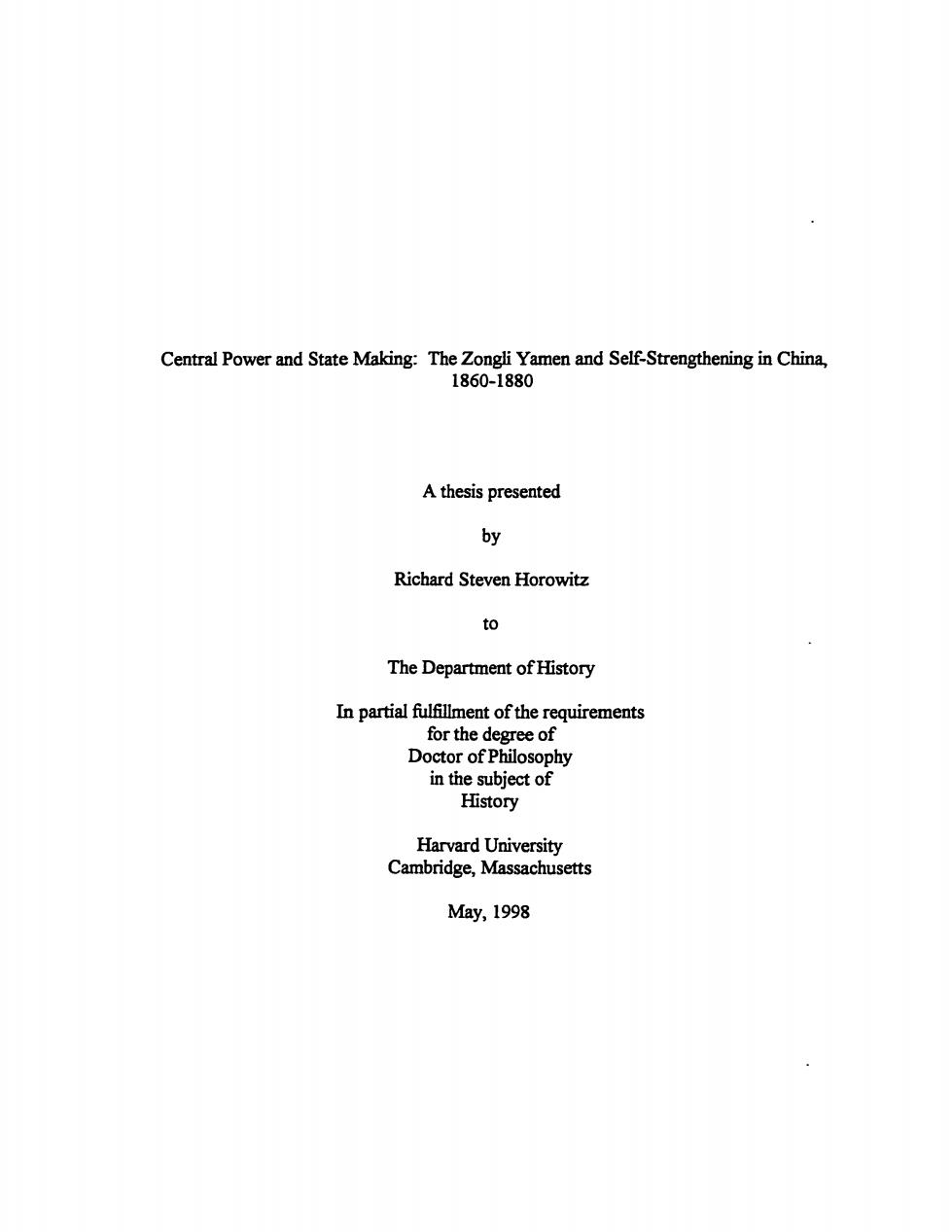
Central Power and State Making:The Zongli Yamen and Self-Strengthening in China, 1860-1880 A thesis presented by Richard Steven Horowitz to The Department of History In partial fulfillment of the requirements for the degree of Doctor of Philosophy in the subject of History Harvard University Cambridge,Massachusetts May,1998
Central Power and State Making: The Zongli Yarnen and Self-Strengthening in China, 1860-1880 A thesis presented by Richard Steven Horowitz to The Department of History In partial fulfillment of the requirements for the degree of Doctor of Philosophy in the subject of History Harvard University Cambridge, Massachusetts May, 1998
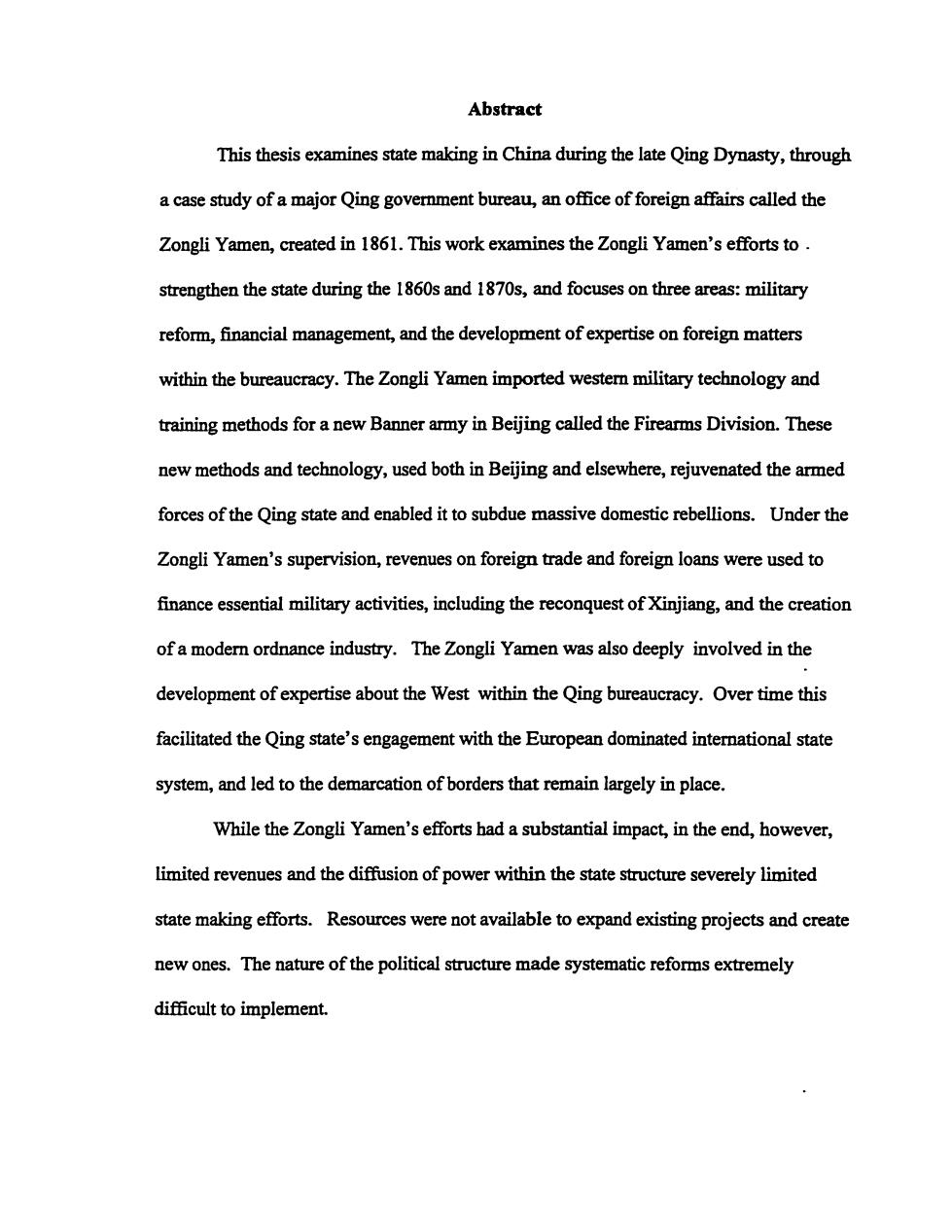
Abstract This thesis examines state making in China during the late Qing Dynasty,through a case study of a major Qing government bureau,an office of foreign affairs called the Zongli Yamen,created in 1861.This work examines the Zongli Yamen's efforts to. strengthen the state during the 1860s and 1870s,and focuses on three areas:military reform,financial management,and the development of expertise on foreign matters within the bureaucracy.The Zongli Yamen imported westem military technology and training methods for a new Banner army in Beijing called the Firearms Division.These new methods and technology,used both in Beijing and elsewhere,rejuvenated the armed forces of the Qing state and enabled it to subdue massive domestic rebellions.Under the Zongli Yamen's supervision,revenues on foreign trade and foreign loans were used to finance essential military activities,including the reconquest of Xinjiang,and the creation of a modern ordnance industry.The Zongli Yamen was also deeply involved in the development of expertise about the West within the Qing bureaucracy.Over time this facilitated the Qing state's engagement with the European dominated international state system,and led to the demarcation of borders that remain largely in place While the Zongli Yamen's efforts had a substantial impact,in the end,however, limited revenues and the diffusion of power within the state structure severely limited state making efforts.Resources were not available to expand existing projects and create new ones.The nature of the political structure made systematic reforms extremely difficult to implement
Abstract This thesis examines state making in China during the late Qing Dynasty, through a case study of a major Qing government bureau, an office of foreign affairs called the Zongli Yamen, created in 1861. This work examines the Zongli Yamen's efforts to . strengthen the state during the 1860s and 1870s, and focuses on three areas: military reform, financial management, and the development of expertise on foreign matters within the bureaucracy. The Zongli Yamen imported western military technology and training methods for a new Banner army in Beijing called the Firearms Division. These new methods and technology, used both in Beijing and elsewhere, rejuvenated the armed forces of the Qing state and enabled it to subdue massive domestic rebellions. Under the Zongli Yamen's supervision, revenues on foreign trade and foreign loans were used to finance essential military activities, including the reconquest of Xinjiang, and the creation ofa modem ordnance industry. The Zongli Yamen was also deeply involved in the development of expertise about the West within the Qing bureaucracy. Over time this facilitated the Qing state's engagement with the European dominated international state system, and led to the demarcation of borders that remain largely in place. While the Zongli Yamen's efforts had a substantial impact, in the end, however, limited revenues and the diffusion of power within the state structure severely limited state making efforts. Resources were not available to expand existing projects and create new ones. The nature of the political structure made systematic reforms extremely difficult to implement
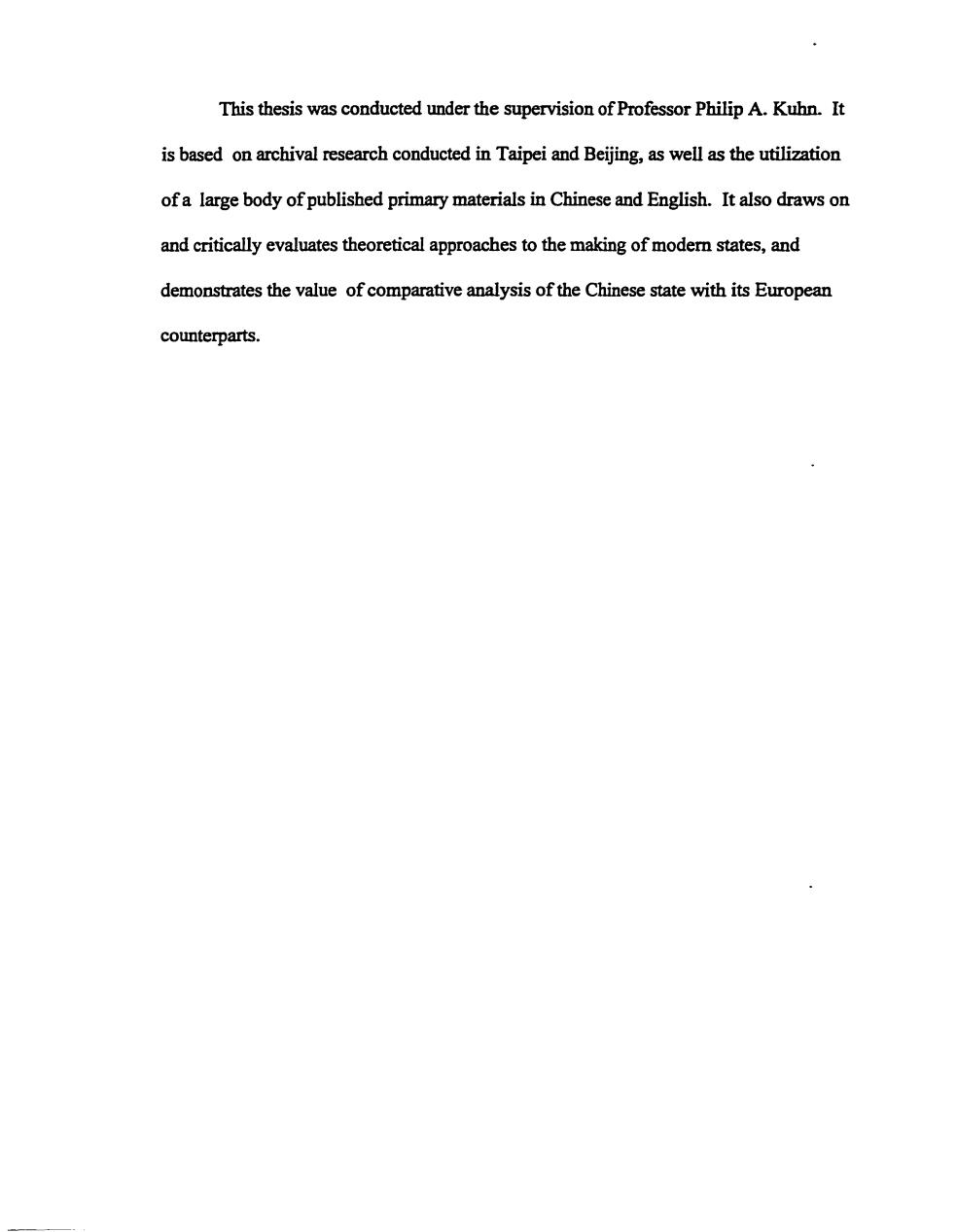
This thesis was conducted under the supervision of Professor Philip A.Kuhn.It is based on archival research conducted in Taipei and Beijing,as well as the utilization of a large body of published primary materials in Chinese and English.It also draws on and critically evaluates theoretical approaches to the making of modern states,and demonstrates the value of comparative analysis of the Chinese state with its European counterparts.
This thesis was conducted under the supervision of Professor Philip A. Kuhn. It is based on archival research conducted in Taipei and Beijing, as well as the utilization of a large body of published primary materials in Chinese and English. It also draws on and critically evaluates theoretical approaches to the making of modem states, and demonstrates the value of comparative analysis of the Chinese state with its European counterparts
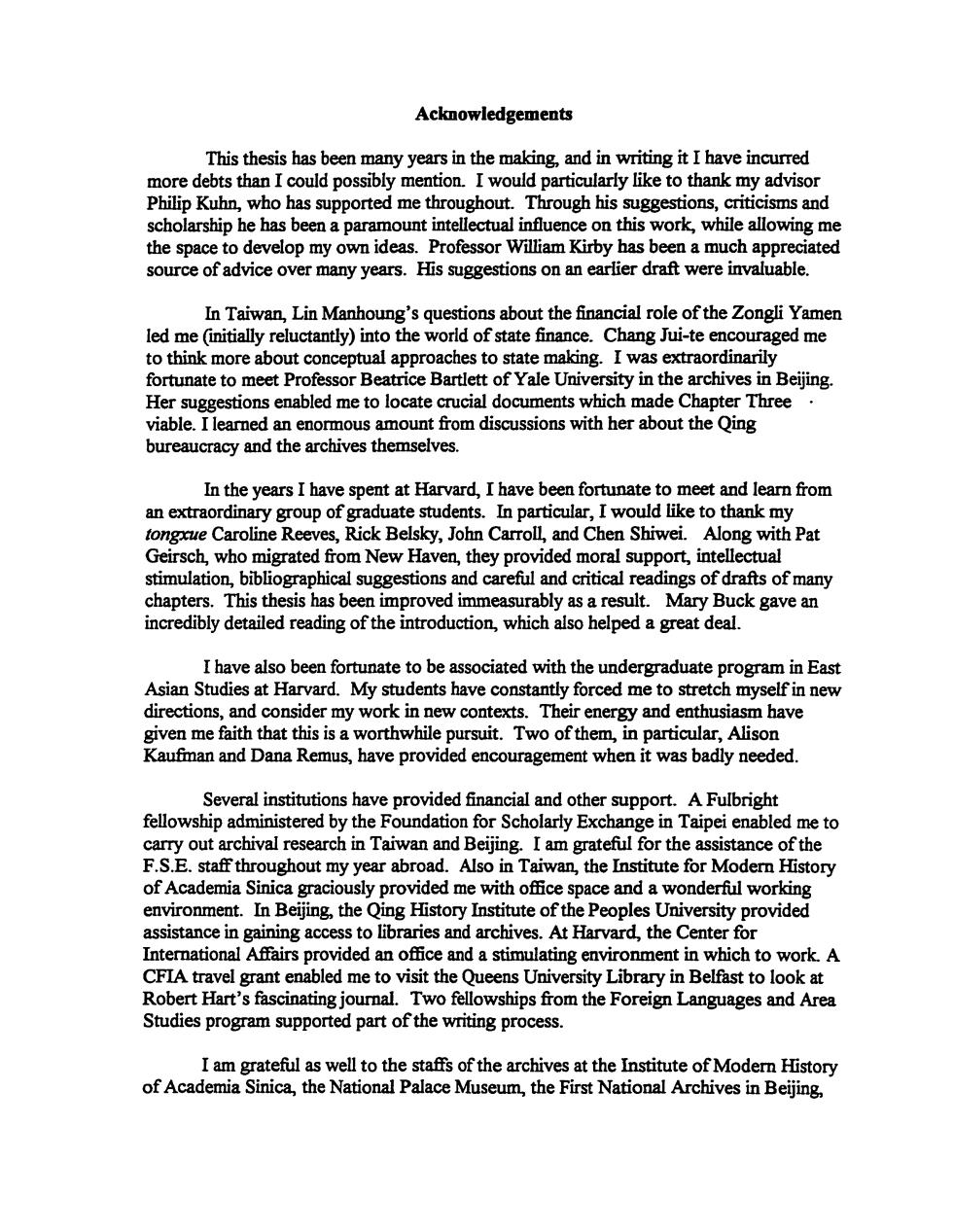
Acknowledgements This thesis has been many years in the making,and in writing it I have incurred more debts than I could possibly mention.I would particularly like to thank my advisor Philip Kuhn,who has supported me throughout.Through his suggestions,criticisms and scholarship he has been a paramount intellectual influence on this work,while allowing me the space to develop my own ideas.Professor William Kirby has been a much appreciated source of advice over many years.His suggestions on an earlier draft were invaluable In Taiwan,Lin Manhoung's questions about the financial role of the Zongli Yamen led me (initially reluctantly)into the world of state finance.Chang Jui-te encouraged me to think more about conceptual approaches to state making.I was extraordinarily fortunate to meet Professor Beatrice Bartlett of Yale University in the archives in Beijing. Her suggestions enabled me to locate crucial documents which made Chapter Three viable.I learned an enormous amount from discussions with her about the Qing bureaucracy and the archives themselves. In the years I have spent at Harvard,I have been fortunate to meet and learn from an extraordinary group of graduate students.In particular,I would like to thank my fongxue Caroline Reeves,Rick Belsky,John Carroll,and Chen Shiwei.Along with Pat Geirsch,who migrated from New Haven,they provided moral support,intellectual stimulation,bibliographical suggestions and careful and critical readings of drafts of many chapters.This thesis has been improved immeasurably as a result.Mary Buck gave an incredibly detailed reading of the introduction,which also helped a great deal. I have also been fortunate to be associated with the undergraduate program in East Asian Studies at Harvard.My students have constantly forced me to stretch myself in new directions,and consider my work in new contexts.Their energy and enthusiasm have given me faith that this is a worthwhile pursuit.Two of them,in particular,Alison Kaufman and Dana Remus,have provided encouragement when it was badly needed. Several institutions have provided financial and other support.A Fulbright fellowship administered by the Foundation for Scholarly Exchange in Taipei enabled me to carry out archival research in Taiwan and Beijing.I am grateful for the assistance of the F.S.E.staff throughout my year abroad.Also in Taiwan,the Institute for Modern History of Academia Sinica graciously provided me with office space and a wonderful working environment.In Beijing,the Qing History Institute of the Peoples University provided assistance in gaining access to libraries and archives.At Harvard,the Center for International Affairs provided an office and a stimulating environment in which to work.A CFIA travel grant enabled me to visit the Queens University Library in Belfast to look at Robert Hart's fascinating journal.Two fellowships from the Foreign Languages and Area Studies program supported part of the writing process. I am grateful as well to the staffs of the archives at the Institute of Modern History of Academia Sinica,the National Palace Museum,the First National Archives in Beijing
Acknowledgements This thesis has been many years in the making, and in writing it I have incurred more debts than I could possibly mention. I would particularly like to thank my advisor Philip K~ who has supported me throughout. Through his suggestions, criticisms and scholarship he has been a paramount intellectual influence on this work, while allowing me the space to develop my own ideas. Professor William Kirby has been a much appreciated source of advice over many years. His suggestions on an earlier draft were invaluable. In Taiwan, Lin Manhoung's questions about the financial role of the Zongli Yarnen led me (Initially reluctantly) into the world of state finance. Chang lui-te encouraged me to think more about conceptual approaches to state making. I was extraordinarily fortunate to meet Professor Beatrice Bartlett of Yale University in the archives in Beijing. Her suggestions enabled me to locate crucial documents which made Chapter Three viable. I learned an enormous amount from discussions with her about the Qing bureaucracy and the archives themselves. In the years I have spent at Harvard, I have been fortunate to meet and learn from an extraordinary group of graduate students. In particular, I would like to thank my tongxue Caroline Reeves, Rick Belsky, lohn Carroll, and Chen Shiwei. Along with Pat Geirsch, who migrated from New Haven, they provided moral support, intellectual stimulation, bibliographical suggestions and careful and critical readings of drafts of many chapters. This thesis has been improved immeasurably as a result. Mary Buck gave an incredibly detailed reading of the introduction, which also helped a great deal. I have also been fortunate to be associated with the undergraduate program in East Asian Studies at Harvard. My students have constantly forced me to stretch myself in new directions, and consider my work in new contexts. Their energy and enthusiasm have given me faith that this is a worthwhile pursuit. Two of them, in particular, Alison Kallfinan and Dana Remus, have provided encouragement when it was badly needed. Several institutions have provided financial and other support. A Fulbright fellowship administered by the Foundation for Scholarly Exchange in Taipei enabled me to carry out archival research in Taiwan and Beijing. I am grateful for the assistance of the F.S.E. staff throughout my year abroad. Also in Taiwan, the Institute for Modem History of Academia Sinica graciously provided me with office space and a wonderful working environment. In Beijing, the Qing History Institute of the Peoples University provided assistance in gaining access to horaries and archives. At Harvard, the Center for International Affairs provided an office and a stimulating environment in which to work. A CFIA travel grant enabled me to visit the Queens University Library in Belfast to look at Robert Hart's fascinatingjoumal. Two fellowships from the Foreign Languages and Area Studies program supported part of the writing process. I arn grateful as well to the staffs of the archives at the Institute of Modem History of Academia Sinica, the National Palace Museum, the First National Archives in Beijing
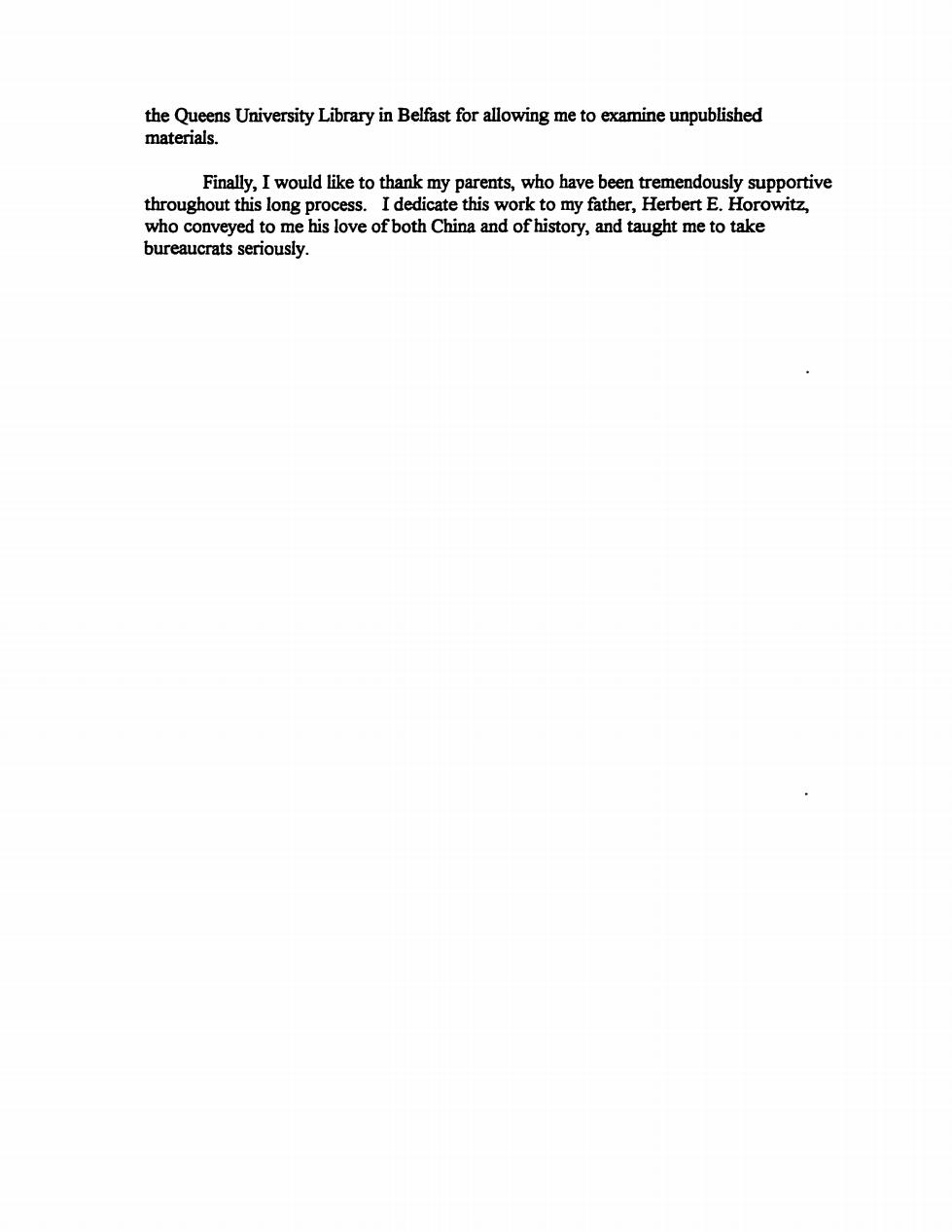
the Queens University Library in Belfast for allowing me to examine unpublished materials. Finally,I would like to thank my parents,who have been tremendously supportive throughout this long process.I dedicate this work to my father,Herbert E.Horowitz, who conveyed to me his love of both China and of history,and taught me to take bureaucrats seriously
the Queens University Library in Belfast for allowing me to examine unpublished materials. Finally, I would like to thank my parents, who have been tremendously supportive throughout this long process. I dedicate this work to my father, Herbert E. Horowitz, who conveyed to me his love of both China and of history, and taught me to take bureaucrats seriously